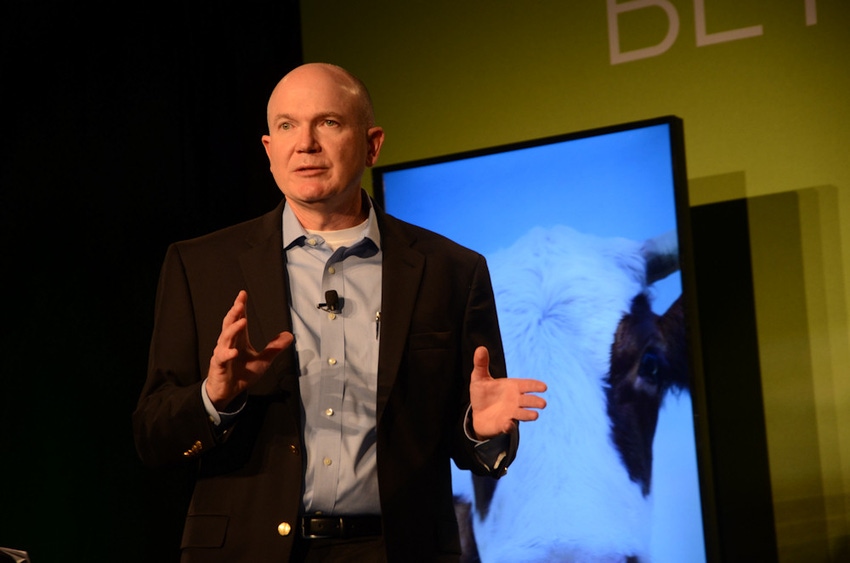October 4, 2016

Agriculture is on the precipice of great change. In fact, David Hollinrake told an audience recently that he was "thinking about today as being the first day of the future of agriculture" but noted there are many challenges ahead. Hollinrake, who is vice president for North American Marketing at Bayer, wants to be part of the effort to overcome those challenges.
Speaking recently at the Agricultural Bioscience International Conference, Hollinrake called out some of the challenges including the negative sentiment against modern ag practices. "There is nothing more pressing than to develop an agvocate platform to engage stakeholders to show them the benefits of modern agriculture," he says.
That term - agvocate - the merger of agriculture and advocate - is one used often at Bayer. Hollinrake explains that it sums up the work ahead for farmers - to advocate for ag. And Bayer wants to work to help empower farmers to speak on the industry's behalf. The key is working to educate those that have a misunderstanding of agriculture that "threatens our license to operate."
During his talk, Hollinrake notes that there's a need to work together to amplify agriculture's voice. And the key is to make consumers understand that agriculture is changing for the good, and that modern technology is important for the future.
"Smart algorithms for crops, automated equipment, working from a central control room using GPS guided autonomous drones and GPS guided equipment with precision that sometimes goes even to the level of an individual plant," Hollinrake says. "And there are crops that have been genetically engineered to resist fungi, disease and use less fertilizer and water."
He explains that these innovations have happened in the past though they may sound like the future. These tools combined with the rapid digitization of farming are moving us from "precision ag to decision ag and it's an exciting area."
Some of those forces are part of what is driving Bayer and Monsanto to come together too, he says. He points to the fact that Bayer is a life science company working with plants, animals and human health and that the same fundamental tools and techniques used to find solutions to human disease can be used to remedy plant diseases.
The changing landscape for ag, where a report shows that 30 million acres of land are degraded annually becoming unproductive is a resource utilization challenge. "How do we help farmers do what they do in an increasingly difficult environment?" he asks.
That social license
Hollinrake says that agriculture, and the ag industry, has not done a good job of "telling our story."
He goes through a recent consumer survey that showed 74% of consumers want to eat food grown without the use of pesticides. In that survey, 88% believe that crop protection companies are not responsible and many even distrust them.
Hollinrake says the 88% number "really hurts me. Trust is a foundational element if you have a relationship with the consumer." He adds that this distrust is a hindrance to companies working to innovate in agriculture. "I believe Bayer and companies like Bayer operate in the most responsible way we can to bring innovation to the marketplace and feed the world," he adds.
And he adds the same survey shows 66% of those surveyed don't think the crop protection industry is important. "We're trying to shape the policy of the future and there's a disconnect relative to the consumer population. That should alarm you. It does me," he told his audience.
The key, Hollinrake says, is to connect the head (logic) and the heart (emotion) in the food conversation and bring farmers into the dialog. It turns out that surveys show that consumers trust farmers more than anyone else when it concerns food issues. That's why Bayer has created an agvocate platform which has tools and resources farmers can use to tell the modern agriculture story.
You can see those tools at cropscience.bayer.us/our-commitment/agvocate.
Hollinrake says that the materials provided concern the understanding that consumers have choice, and if they choose organic that's fine. "We should be fine with that decision. A lot of folks, including myself, in the past have criticized that. It's more of a 'yes' and a discussion. If a consumer has a preference for organic and natural food and can afford it, that's fine."
He adds, however, that for the challenges ahead modern ag is important. "We are moving from a science-based conversation to a discussion with folks that oppose what we do and help them bridge to the benefits of what [farmers] do."
Farmers can be an "incredibly powerful voice together," he concludes.
About the Author(s)
You May Also Like






